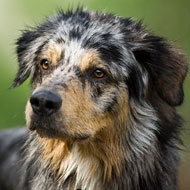Dog flu outbreak reaches 1,000 cases

It is not yet known whether commercially available vaccines for H3N8 are effective in protecting against H3N2.
At least 1,000 dogs in Chicago have become infected with the H3N2 strain of canine influenza virus (CIV). It is the first time the strain has ever been seen in North America, and experts suspect a recent introduction from Asia.
Beginning in March this year, Chicago vets reported a rise in the number of dogs being presented with respiratory problems. CIV, or 'dog flu', has now affected dogs in Wisconsin, Ohio and Indiana, with one confirmed case in Madison.
“This is the first time this strain of CIV has been found in North America, so there’s a lot we don’t yet know about it,” said Edward Dubovi, professor of virology at the College of Veterinary Medicine, Cornell University.
Initially the cases were thought to be due to the H3N8 strain that has been circulating in North America for more than a decade. However, testing by the Wisconsin Veterinary Diagnostic Laboratory (WVDL) and New York State Animal Diagnostic Laboratory at Cornell, has since confirmed otherwise.
It is not yet known whether commercially available vaccines for H3N8 are effective in protecting against H3N2. However, Keith Poulson from WVDL said these are "likely to be less effective".
In a statement, WVDL said there is no evidence to suggest this strain of the virus presents a risk to humans. However, H3N2 has been known to cause infection and respiratory illness in cats.
It is closely related to the Asian strain of influenza A H3N2, which has been circulating in Chinese and South Korean dog populations since 2006.
Mr Poulson said: "It's believed that the H3N2 strain was introduced here from Asia, but how it happened is not known."
Both strains of the virus cause a persistent cough, runny nose and fever, though a small number of affected dogs will have more severe clinical signs, and others may have no symptoms at all.
Pet owners are being advised to avoid bringing their dog into close contact with other dogs, practice good hygiene and seek advice from a vet if their dog or cat has a persistent cough, runny nose and fever.
Getting dogs vaccinated is also recommended. While it is not known if current vaccines against H3N8 are effective against the emerging strain, the University of Wisconsin's School of Veterinary Medicine says this will reduce the incidence and severity of the disease in H3N8-infected dogs.



 The latest
The latest